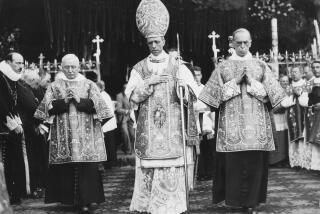Document Tied to Waldheim Called a Fake
- Share via
BELGRADE, Yugoslavia — A document said to link Austrian President Kurt Waldheim to Nazi war crimes was a fake, and a forgery investigation is under way, the state news agency Tanjug reported Wednesday.
The document, purporting to be a telegram advising that a Lt. Kurt Waldheim had requested the deportation of over 4,000 Yugoslav civilians during World War II was published by the West German magazine Der Spiegel last week.
The state news agency Tanjug said: “A commission of historians, archivists and other experts, formed by the competent Yugoslav organs, has reached the conclusion that the telegram is not an authentic document and that there is a founded suspicion that a forgery is in question.”
A commission set up by the Austrian government found that Waldheim, despite his denials, was aware of deportations of civilians in the Balkans, but it said there was no evidence that he had a direct hand in war crimes.
Waldheim claimed the commission’s report absolved him of any war guilt and insisted he would resist the growing demands that he resign. On Wednesday he performed one of the duties of his largely ceremonial office by welcoming King Hussein of Jordan on an official visit to Vienna, the first by a foreign head of state since Waldheim’s election in July, 1986.
Waldheim has generally been shunned by other foreign leaders since the coontroversy over his Nazi ties arose during the presidential campaign. He has met with Hussein in Jordan, with Pope John Paul II in the Vatican and with President Zia ul-Haq in Parkistan.
Referring to the wartime telegram, Tanjug said it has learned that Belgrade’s public prosecutor has called for a legal investigation to determine if it was forged.
A spokesman for the prosecutor’s office in Hamburg, West Germany, told Reuters on Tuesday that it was investigating unidentified individuals on suspicion of document forgery, fraud and insulting a foreign head of state.
A typewriting expert had concluded that the machine used to type the telegram was not available before 1949--four years after the end of the war, he said.
Der Spiegel published the telegram last week and said it was provided by a Yugoslav historian.
More to Read
Sign up for Essential California
The most important California stories and recommendations in your inbox every morning.
You may occasionally receive promotional content from the Los Angeles Times.












